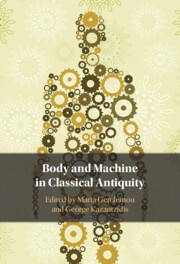
How modern is the concept of a posthuman, mechanical body which extends beyond its flesh and skin and interacts with inorganic material to the extent of blurring the boundaries between its deep nature and that of the inanimate objects and technological artefacts that surround it? Can the function of a human body be fully explained in analogy to human-made devices and machines? And if this is so, when illness befalls us, does one need only to restore the proper functioning of the human machine by tightening or loosening or tinkering its mechanisms?
In an attempt to trace the history of these questions in Greco-Roman antiquity, we discuss the conceptual, multifaceted links between the human body, its function and form, both with simple types of technologies, i.e. with the form and/or function of basic or advanced tools and devices, as well as with techniques applied to and with processes delicately embedded in machines. Our volume brings together several discussions focusing on the relationship between human bodies and technological devices by exploring a number of case studies ranging from the Homeric epic and Pindar to the Hippocratic Corpus, Aristotle, Hellenistic medicine, Celsus and Galen. Moreover, it combines a wide range of different fields and disciplines, including literary and scientific sources, textual and archaeological material, philosophical and medical evidence, aesthetics and mechanics. Its aim is to create a cross-disciplinary space for exploring the notion of the body as an artefact and machine both at the level of metaphor (in which case the technical and mechanical are applied as hermeneutic tools and analogues which help to enhance our understanding of the human body) but also at the level of its actual reproduction and realization through the construction of automata. The volume is divided into three sections: the first section is focused on the interactions between human bodies and the technologies we invent. The second section goes on to explore the relationship between bodies and technical apparatuses in the Hippocratic corpus; the third section concentrates on the way mechanics becomes consolidated as a clearly visible, independent scientific field during the Hellenistic period onwards, and how that consolidation brings with radical changes in the way the human body is examined, presented, and understood by doctors.
The artefactual, technical and mechanical body we discuss in our volume is linked to scientific progress both in the field of technology and in that of medicine and helps to flesh out the symbiotic relationship between the natural and the artificial as well as the failure of techne to fully represent, reproduce and restore the human body. By insisting on the desired life-like qualities of its technology, ancient mechanics invokes medicine in a way that essentially blurs the line between the natural and the artificial, by inviting us to view the operation of a well-crafted machine in light of the spontaneous automatisms that rule human life. Medicine, on the other hand, by means of approaching the body through a system of close correspondences with technology and machines, provides concrete information for understanding the design and function of specific body parts and organs; at the same time, it shows those parts to function, look and even be almost identical to products of human ingenuity and craft, thus inviting us to wonder both at the artistry of humans but also, essentially, at the artistry of Nature.

Body and Machine in Classical Antiquity
by Maria Gerolemou and George Kazantzidis
Latest Comments
Have your say!